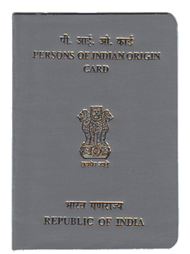Persons of Indian Origin Card
| Persons of Indian Origin Card | |
|---|---|
 | |
| Date first issued | 15 September 2002 |
| Issued by |
|
| Purpose | Identification |
| Expiration |
9 January 2015 (merged with OCI) |

Persons of Indian Origin Card (PIO Card) was a form of identification issued to a Person of Indian Origin who held a passport in a country other than Afghanistan, Bangladesh, Bhutan, China, Nepal, Pakistan and Sri Lanka.
On 9 January 2015, the Person of Indian Origin card scheme was withdrawn by the Government of India and was merged with the Overseas Citizen of India card scheme.[1] All currently held PIO cards are treated as OCI cards. PIO card holders will get a special stamp in their existing PIO card, saying "lifelong validity" and "registration not required", thus making them equal to existing OCI cards.[2] An extended deadline was given where the card could be converted for free to an OCI before 30 June 2017.[3]
Conditions
The conditions for issuing a PIO card to a person were:[4]
- Any person who has ever held an Indian passport, or
- The person's parents, grandparents or great grandparents were born in and were permanent residents of India and never moved to (i.e., were never nationals of) Bangladesh and Pakistan, or
- The person is the spouse of a citizen of India or of a PIO and has been so for two years or more, and
- The person and his/her parents, grandparents or great grandparents must not have been a national of Bangladesh or Pakistan at any point of time.
The PIO Card programme came into effect on 15 September 2002.
Uses
The various benefits available to a PIO cardholders were:
- Visa-free entry into India during the period of validity of PIO Card.
- Exemption from the requirement of registration if stay in India does not exceed six months. Should the continuous stay exceed six months, registration is not required even if their visit exceeds 180 days.
- Parity with non-resident Indians in respect of facilities available to the latter in economic, financial and educational fields.
- All facilities in the matter of acquisition, holding, transfer and disposal of immovable properties in India except in matters relating to the acquisition of agricultural/plantation properties.
- Facilities available to children of Non-Resident Indians for getting admission to educational institutions in India including medical colleges, engineering colleges, Institutes of Technology, Institutes of Management etc. under the general categories.
- Facilities available under the various housing schemes of LIC, State Governments and other Government agencies.
Persons with a PIO were not:
- eligible to vote
- eligible for an Inner Line Permit. They had to apply for a Protected area permit.
Registration/Residential Permit
PIO card holders needed to with the appropriate FRRO (Foreigner Regional Registration Office) if they are planning to stay in India for more than 180 days. This requirement is not applicable for minors.[5] However, in November 2014, this requirement was removed.
The FRRO will issue a "Residential Permit For PIO" which is typically valid till the expiry of the PIO card holder's passport. On 28 September 2014, Prime Minister Narendra Modi announced at Madison Square Garden (New York) that PIO card holders would be granted lifelong visas.[6] This became a reality in November.
See also
References
- ↑ "Website of Consulate General of India". Retrieved 9 January 2015.
- ↑ http://indembassybern.ch/eoi.php?id=PIO
- ↑ "Person Of Indian Origin (PIO)". boi.gov.in. Bureau of immigration India, Government of India. Retrieved 22 April 2017.
- ↑ "IHC Visa Information - Australia - Home - Persons of Indian Origin(PIO)". vfs-in-au.net. Retrieved 10 January 2012.
- ↑ "Last sentence of 2nd point under registration". boi.gov.in. Archived from the original on 25 June 2014. Retrieved 2 July 2014.
- ↑ "PMO India on Twitter". Retrieved 28 Sep 2014.